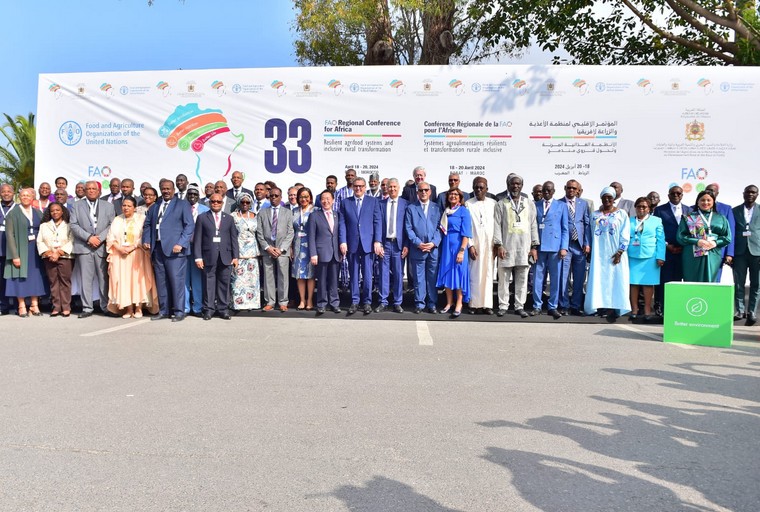Rédaction Africa Links 24 with L’Opinion avec MAP
Published on 2024-04-18 17:19:00
Speaking on this occasion, Mr. Sadiki emphasized the actions taken by the Kingdom in the agricultural sector which have enabled it to face a context marked by multiple crises.
In this sense, the minister recalled the “Green Morocco Plan” (PMV) launched in 2008, which laid the foundations of Morocco’s agricultural policy within a long-term vision aiming to promote food sovereignty and security.
He added that in 2020, the Kingdom implemented the “Green Generation” strategy based on the results and lessons learned from the PMV, with the objective of placing humans at the heart of the agricultural strategy and developing sustainable and resilient agriculture.
“Impacted by climate change, African countries are called to produce more with less resources, especially in terms of water,” Mr. Sadiki remarked, citing Morocco’s water policy in this regard.
Moreover, the minister mentioned the fisheries sector which also contributes to food security with the implementation of the Halieutis strategy, noting that Morocco is one of the leading African countries in terms of fisheries production.
On the other hand, the director of the National Institute of Agronomic Research (INRA), Faouzi Bekkaoui, focused on the major role of scientific research in enhancing resilience to climate change.
Mr. Bekkaoui presented the efforts made by INRA for the resilience of the Moroccan agricultural sector in the face of climate change, particularly through the “water, energy, food” Nexus approach which aims to ensure long-term access to water, energy, and food, precision agriculture, and gene banks.
He emphasized the importance of preserving biodiversity to maintain ecological balance, food security, and forest resilience.
Regarding irrigation and agricultural development, the director within the ministry, Ahmed Bouari, stated that irrigated agriculture, which plays a major role in food security, improving living standards, and stabilizing rural populations, is a priority of public policies.
According to him, Morocco has lost 30% of its water resources due to the impacts of climate change, emphasizing the strong correlation between rainfall and cereal production.
“Morocco remains committed to meeting the challenge of water for food sovereignty, through the Green Generation strategy and the National Program for Drinking Water Supply and Irrigation (PNAEPI) which aim to improve water efficiency and develop water supply,” Bouari supported.
Furthermore, the director general of the Agricultural Development Agency (ADA), El Mahdi Arrifi, highlighted small-scale agriculture with the launch of a new generation of solidarity agriculture projects through the Green Generation strategy.
“Thanks to a territorial approach, the development of production systems, and dedicated support to professional organizations, 323 projects have been launched with a budget of 3.4 billion dirhams, benefiting 192,000 beneficiaries,” Arrifi stated.
In his intervention, the director of the National Institute of Fisheries Research (INRH), Abdelmalek Faraj, shed light on the Blue Belt initiative launched in 2016 during COP22 in Marrakech. Faraj viewed this initiative as a strategic response from Morocco to further support national, regional, and international policies.
In this regard, he called for the commitment of stakeholders, the creation of more partnerships, the strengthening of mitigation measures, and the consolidation of regional and sub-regional coastal ocean observation networks.
Organized under the auspices of the Kingdom of Morocco, this three-day conference provided a major opportunity for African countries to discuss practical and concrete solutions for food security and improving agricultural production, and to define priorities with the FAO for the next two years, aiming to achieve transformative and sustainable change in agri-food systems throughout the continent.
This strategic regional meeting focusing on food security and rural development in Africa includes the participation of ministers from African member states, representatives from observer countries, the African Union, donor organizations, civil society, and the private sector.
Read the original article(French) on L’Opinion
